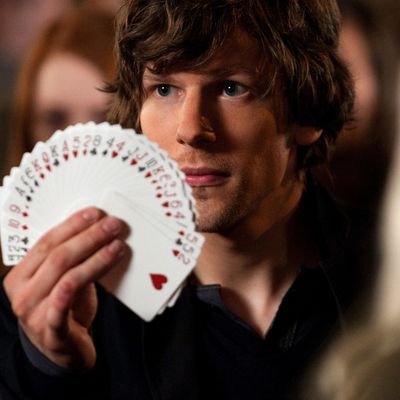
The wannabe magical mystery adventure Now You See Me opens with the words, “The closer you look, the less you see,” and it doesn’t know how right it is. A grandiose, far-fetched, somewhat tongue-in-cheek caper thriller in which a group of do-gooding outlaw magicians set the FBI and Interpol on an international wild-goose chase, director Louis Leterrier’s film is the kind that doesn’t stand up well to scrutiny: The more you know about it, the more befuddled you’ll be.
The film starts off with a series of scenes in which an unknown figure wearing a hoodie makes contact with four different magicians all working solo – there’s a small-time hypnotist and mind reader (Woody Harrelson), a master pickpocket (Dave Franco), an ambitious street magician (Jesse Eisenberg), and a bold escape artist (Isla Fisher). Soon enough, these four are mysteriously brought together and, a year later, are staging a major show in Las Vegas — a show whose climax features them robbing a French bank through a process they claim is teleportation, then showering their audiences with the stolen cash. The Feds, in the form of rumpled, perpetually flummoxed agent Dylan Hobbs (Mark Ruffalo), and Interpol, in the form of hypnotically beautiful agent Alma Vargas (Melanie Laurent), start to follow them, but there’s a catch: To admit that an actual crime was committed, we’re told, would mean the FBI institutionally accepts that magic is real. There’s another catch, and a more obvious one: Magicians who rain money down on their audiences tend to be very popular, and it’s hard to nab these guys when the audience is on their side.
Most movies about illusionists have a certain gee-whiz satisfaction when the tricks are finally explained, even if the explanations themselves breach the boundaries of the possible. (Christopher Nolan’s The Prestige, in which Hugh Jackman toys with faux modern science to one-up his rival Christian Bale, is an excellent example.) In Now You See Me, though, the explanations for the tricks raise more questions than the tricks themselves. One bit, involving a massive safe that disappears from a supposedly unbreachable vault, is a real doozy; the film tries to explain it away with a few brief shots at the end, which make the whole process look way more involved and complicated than just stealing the safe itself. Now You See Me is at times energetic and imaginative, to be sure — it channels the inventive spirit of something a child might have dreamed up — but when it tries to come down to earth and explain itself, it falters. Leterrier also tries to pack an extraordinary amount of story and twists into a fairly ordinary running time, resulting in editing so choppy that sometimes even the easy parts are hard to follow.
There is one thing that Now You See Me does make perfectly clear, however: Our culture’s fascination with Robin Hood figures is a lot more complicated and cynical than it might at first seem. The magicians in this film appear to target institutions that have taken advantage of ordinary people, including an insurance company that ripped off Katrina victims. And there is a suggestion that these anti-heroes may be members of an ancient order of Egyptian magicians called The Eye, who “stole from the Pharaohs to give to the poor.” But Now You See Me ultimately botches that, too: I won’t give away any of the film’s big reveals, but suffice it to say that, as with other heroes and villains who supposedly target the powerful in the name of the downtrodden, these characters have what appear to be smaller motives as well. Justice and equality are nice and all, but revenge, it turns out, is sweeter.


